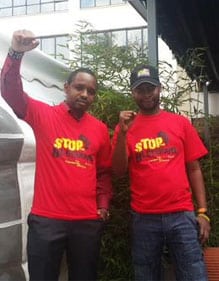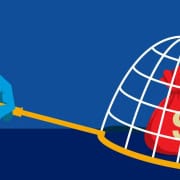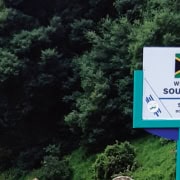|
Getting your Trinity Audio player ready...
|
Africa has been bleeding for decades, losing trillions of dollars to tax dodgers through illicit financial flows. This phenomenon, a common practice by multinational corporations, is also known as “illicit financial flight”.
This is money that could have gone towards development interests for millions of Africans. To help remedy the state of affairs, a new campaign was launched on Thursday that aims to help reverse illicit financial flows from the continent once and for all.
It is estimated that the continent alone loses US$50-billion each year to illicit capital flight, amounting to US$1.8-trillion between 1970 and 2008. This is 20% more than the amount of official development assistance coming in.
Nairobi, Kenya, played host to the launch of Stop the Bleeding, an initiative that is the result of years of work by several organisations operating in the tax justice field, and is a unified African CSO-led campaign to stop illicit financial flows from Africa. With this initiative, the Interim Working Group (IWG) of the African Illicit Financial Flow Campaign Platform aims to eradicate this particular illegal practice of large businesses doing work on the continent.
Other organisations involved include Tax Justice Network – Africa; Third World Network – Africa; Africa Forum and Network on Debt and Development; the African Women’s Development and Communication Network; the African Regional Organisation of the International Trade Union Confederation; and Trust Africa.
Government/AU support
 A recent report from the African Union (AU) / Economic Commission for Africa’s high level panel on illicit financial flows from Africa, chaired by former president Thabo Mbeki, estimates that the African continent alone is losing roughly $50-billion each year.
A recent report from the African Union (AU) / Economic Commission for Africa’s high level panel on illicit financial flows from Africa, chaired by former president Thabo Mbeki, estimates that the African continent alone is losing roughly $50-billion each year.
In its January declaration on illicit financial flows, the AU Assembly asserted that “curtailing illicit financial flows through, inter alia, institutionalising prudent legal and regulatory regimes, including fiscal policies that disallow financial secrecy, fight corruption, institute and/or strengthen African institutions, build African member states capacity for contract negotiation, tax administration and identify and return the resources lost through illicit financial flows can greatly contribute to the alternative sources of financing Africa’s development agenda”.
Download the Declaration on Illicit Financial Flows
A report on the subject, developed by Mbeki’s panel, was adopted at the assembly. During the Africa Day commemoration at the Pan-African Parliament in Johannesburg in May, Mbeki delivered an address on the findings of the report.
The AU further requested support from its commission; the Economic Commission for Africa, African Development Bank, African Capacity Building Foundation and other development partners. This would include building capacity for AU member states and institutions in the areas of contract negotiation; tax management; regulatory legal frameworks; policies on money laundering, asset recovery and repatriation; and resource governance for effective and optimal management and governance of the continent’s natural resources.
Campaigning for transparency and accountability
According to the IWG, the significance of Stop the Bleeding is that it’s driven by civil society organisations in Africa, which are supported by their international counterparts. In his 2014 Africa Progress Panel report, chairperson Kofi Annan said: “Global collective action is needed to nurture transparency and accountability. In the year since our last report was published, notable action has been taken on beneficial ownership, tax avoidance and evasion, and resource revenues. Further technical and financial support to African governments will also help reduce the illicit flows of timber, fish and money.”
As a follow up to the public launch in June, the IWG said a side event will be held at the upcoming 3rd Financing for Development Conference in July at Addis Ababa, Ethiopia.
A recent Mail & Guardian report stated that there would soon be a move by G20 countries to adopt measures that will make it harder for multinational companies and ultra-rich individuals to hide their money.
“Officials conducting ongoing work for the Organisation for Economic Co-operation and Development to overhaul the international tax regime believe ‘behavioural change’ by companies will be immediate,” read the report.
For Africa, it could mean an eventual turnaround in development milestones and the preservation of its natural resources for its own people.
“The figure of $50-billion is… an underestimate as it excludes such elements as trade in services and intangibles, proceeds of bribery and trafficking in drugs, people and firearms,” said Mbeki during his recent address to the Pan African Parliament. “As we have said, the African ministers decided to investigate the matter of illicit financial outflows because of the immense developmental challenges which face the Continent.”
For the continent to reach the challenges highlighted by the panel’s report, added Mbeki, requires huge volumes of capital. “Accordingly it does not make any sense that we should be exporting capital which should be retained within our continent.”








